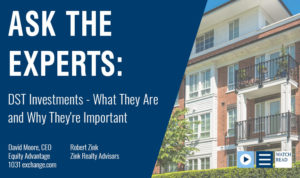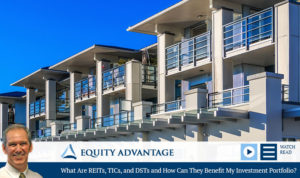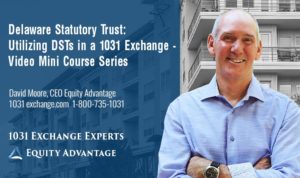A DST, or Delaware Statutory Trust, is a way to invest that takes away the need of daily work required in property upkeep and is appealing to many investors looking to retire or just enjoy more of their lives for themselves. Join David Moore and real expert guest Bob Zink as they discuss the time and energy that investors save with DSTs.
What You Will Learn in This Video
- Why a DST is different from other ways to invest
- The benefits of a DST
- Whether a DST is the right choice for your situation
As we look toward retirement or even just having a little more free time to ourselves and our families, DSTs are a great option for more relaxed investing. Watch the video or read the full transcript below to get the details and learn a little about our expert, Robert Zink. You can check out the full series here.
Read the Full TranscriptDavid Moore: Once again, David Moore with Equity Advantage here with Robert Zink, Zink Reality Advisors. And we are talking about DSTs for the most part, talking about investment real estate, why you got to have it. And I think we just want to talk a little bit more about the DST product itself and why people might want it.
We talked about in the very introduction about heli-scans. So it’s like what’s it take to get there, and it takes obviously you’re ability to get there and spend the money to do it. But it takes time, and as we get older, I think time, health, we were talking earlier. I’ve got a little bit of a cold today, feeling a little punky, but I think we’ll both agree that health’s number one thing in lifetimes and one of those things as we get older it’s more and more important. Both of those issues.
David Moore: So why might I think about getting into a DST instead of going to deal with my tenants and income properties?
Robert Zink: Well, thank you David. I think you mentioned the helicopter skiing as we get older and time. But this past year, several very wealthy people have passed away prematurely from health complications- cancer, Paul Allen, different people. And we realize that this time on this earth is pretty finite.
David Moore: Yes.
Robert Zink: So spending time doing what one enjoys whether it’s traveling or charity or grandkids or whatever is very important. And the DST allows us to own real estate where we don’t have to be involved in the day to day activities. Someone else is responsible for that property in all ways and all the time. We get all the benefits without any of the hassle.
David Moore: You made a comment earlier about making money while you sleep. Obviously that’s one of the great things about real estate. But I think as we get older, we’re probably less tolerant of all the headaches. We want to do more of what we want to do, and we’d like to have and that’s what’s so attractive obviously about Wall Street’s offerings is you make the investment and it’s there.
It’s doing what it’s doing. You don’t have to actually work on it. Real estate, it’s hard work. If you want to be successful at real estate investment, it’s hard work or you’re very, very lucky. But at the end of the day, years after you’ve accumulated this pool of stuff, do you own it or does it own you, and what would be the natural progression at that point? I mean, it seems to me that a DSTs a wonderful place to go. I know my mom doesn’t … It’s not in her to deal with tenants or problems these days. So for her …
Robert Zink: Well, the DST is a very logical transformation or transfer of energy and time and hassles. As somebody else is taking care of it, and something else we really haven’t talk about is as we get older, often we don’t want to take on a mortgage. We don’t want to buy. We need 40%, 50% debt because our last property had it and we kind of don’t want the debt relief.
David Moore: Or maybe we can’t take it on. Maybe we’re not …
Robert Zink: Maybe we’re not employed anymore.
David Moore: We don’t have the income anymore to take care of it.
Robert Zink: Or the wife says, “We’re not ever signing on another mortgage. I’m not doing it.” And that’s probably wise. Well, the DST, you’re not on that mortgage. You have a mortgage in the property but you’re not responsible for it. And so you can have debt without any responsibility, and you don’t have to qualify for the debt.
David Moore: So for somebody that’s got some properties and they’re concerned, and we all see the properties out there that are on the marketplace. We’ll be driving around or maybe we find the dirty swimming pool. But there’s a reason it’s dirty. There’s a reason the properties not kept up. There’s a reason that it looks like somebody doesn’t care.
They don’t or they don’t have the ability to take care of it anymore or whatever it might be. And this seems like a very positive place to go that still gives you the benefit of real estate ownership without actually having to deal with those terrible T’s.
Robert Zink: Right. And something that we haven’t talked about, but today we’re more transitory than we used to be. We move because of job changes, children, get tired of living in a state with a high tax, whatever it is. We move around more, and you’ve got three rental houses in Portland, and your grandkids are all in Boise, what do you do? Well, if you own a DST, it doesn’t matter where you live.
David Moore: Yes.
Robert Zink: They send you a report and a check. So it’s a much more flexible vehicle and has way less day to day hassles and involvement. It’s a way to solve where you live also, which is something we haven’t touched on.
David Moore: So, Bob, when we’re looking at DSTs and we obviously have rules on what can and can’t be talked about on different things, but if we look at DSTs, I mean, if I like multifamily, I’m assuming there’s multifamily product. If I like flex industrial or I like mini storage or I like medical or … I mean, are all those things … Can you sort of pick your food group?
Robert Zink: Yes. There’s enough sponsors today and some of the larger sponsors will sponsor properties in all of those food groups. So if you want an apartment house, they have apartments. You said flex industrial, medical, senior housing, you name it. It’s out there and available to us today.
David Moore: Interesting. And since we’re talking about … Earlier, I sort of talked and stated, I made a comment about DST sort of being an Exchangeable reit. If we’re looking at the tax ability of an investment in that DST space, I think one thing I want to mention if you’re working with a sponsor and they pick out … You pick a DST that’s got 10 different properties and they’re in 10 different states, you might be looking at 10 different tax returns in that situation. So the sponsor you work typically will sort of say, “Okay. Hey, this is going to be a DST that’s going to contain this thing in this space.” Do they try to restrict?
Robert Zink: Try to restrict. Some of them don’t, and I think that’s generally to be avoided because of the tax returns. But typically those multi property DSTs, the properties will all be in the same state or maybe at worse, two states.
David Moore: Yeah. Interesting. I just thought that was something that’s come up a few times. I think it’s important for you to think about. Something that people typically might not think about.
Robert Zink: Right. Until you own it and file it.
David Moore: Exactly. You own it, now it’s like your CPAs saying, “Well, gee. Now you need …” And, by the way, any time we’re looking at commercial or investment real estate, I think a CPAs just essential. You’ve got a situation where you’ve got lots of inexpensive ways to do tax returns these days, but when it comes to this stuff, a good CPA is just money well spent. To be proactive on things is such a great deal.
David Moore: But thank you very much for the comments on the DSTs, and we’re going to come back for one more segment. Thank you. David Moore, Equity Advantage. Robert Zink, Zink Reality Advisors.
Robert Zink: Thank you.
When you are thinking of investing in real estate, the sooner you consult professionals, the better. Give David Moore and his team of experts a call today – 503-635-1031
Related Posts
-
DST Investments - What They Are and Why They're Important
A Delaware Statutory Trust (DST) is a convenient way to invest in real estate that…
-
What Are REITs, TICs, and DSTs and How Can They Benefit My Investment Portfolio?
What is an REIT, a TIC, and a DST? All are different methods for investing…
-
Delaware Statutory Trust: Utilizing DSTs in a 1031 Exchange - Video Mini Course
If you're a real estate investor looking for a less hands-on approach to maintaining your…









